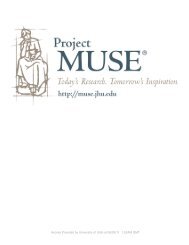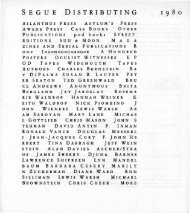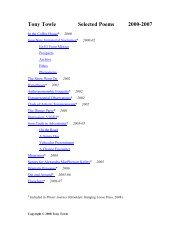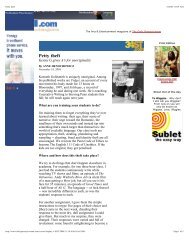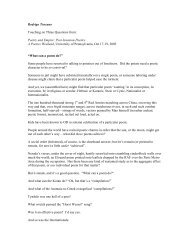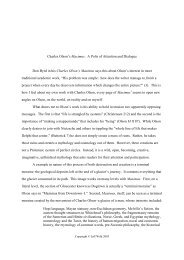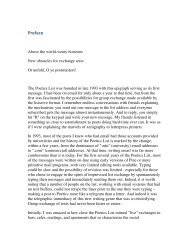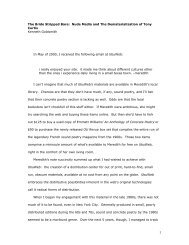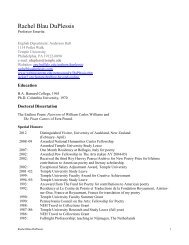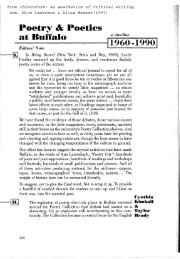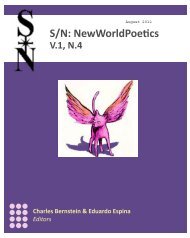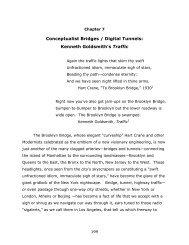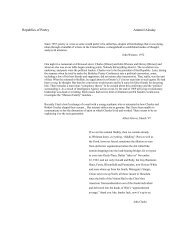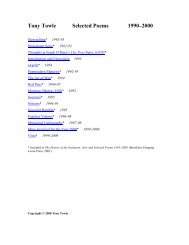P's and Q's of Poetry - Electronic Poetry Center
P's and Q's of Poetry - Electronic Poetry Center
P's and Q's of Poetry - Electronic Poetry Center
You also want an ePaper? Increase the reach of your titles
YUMPU automatically turns print PDFs into web optimized ePapers that Google loves.
DeMinter 17<br />
it is at the same time what makes a writer most acutely conscious <strong>of</strong> his place in time, <strong>of</strong> his<br />
contemporaneity,” (Tradition <strong>and</strong> the Individual). In his review <strong>of</strong> Stewart’s <strong>Poetry</strong> <strong>and</strong> the Fate<br />
<strong>of</strong> the Sense, Donald Wesling argues:<br />
There is a strong historical consciousness, evinced …<strong>of</strong> coherence distributed<br />
across Stewart's book: the transformations <strong>of</strong> Christian descriptions <strong>of</strong> the world,<br />
increasingly a struggle not to cast out the natural world from Cynewulf through<br />
the metaphysicals (Crashaw <strong>and</strong> Thomas Traherne) to Gerard Manley Hopkins,<br />
down to agnostic Thomas Hardy still half ready to credit a ghost in his poem "The<br />
Voice"; changes in relations between the senses <strong>and</strong> temporal abstraction that<br />
make it harder for us in the twenty-first century to apprehend the Renaissance<br />
aesthetics <strong>of</strong> the ratio, the numerical theologies <strong>of</strong> metaphysical mystics like<br />
Traherne, <strong>and</strong> the strictness <strong>of</strong> eighteenth-century rules <strong>of</strong> poetic meter.”<br />
Conversely, there is value in Goldsmith’s transcriptions <strong>of</strong> the unabashed quotidian<br />
lexicon, even if when “confronted with the matter <strong>of</strong> ‘real’ speech (not to mention its stammers<br />
<strong>and</strong> mumbles), we realize that we all sound a bit like Bush,” (Tapper). As Gordon Tapper’s<br />
noted, “Goldsmith could have generated an equally comprehensive snapshot <strong>of</strong> the language <strong>and</strong><br />
the cultural moment it embodies with a sound installation, filling our ears with his week-long<br />
Soliloquy. The translation from speech into writing was, evidently, pivotal, since it thereby<br />
produced something to see.”<br />
The contemporary quotidian is equally deserving <strong>of</strong> textualization <strong>and</strong> preservation as<br />
those lexical forms that have proceeded. <strong>Poetry</strong> can preserve the mainstream <strong>and</strong> imbue it with<br />
value <strong>and</strong> in respecting the malleability <strong>of</strong> language; poetry makes room for the incorporation <strong>of</strong><br />
new metaphoric <strong>and</strong> poetic potentials <strong>of</strong> modern language. At one point, all the traditional forms<br />
were not historic, but were rather innovative, on the forefront <strong>of</strong> linguistic expansion.<br />
Shakespeare’s sonnets are lexically rooted in the middle English <strong>of</strong> Beowulf, but also transcends<br />
<strong>and</strong> builds on it, yet none would argue for Shakespeare’s exclusion from poetry, for we are<br />
blessed with hindsight <strong>and</strong> see Shakespeare’s language, the language <strong>of</strong> Elizabethan English as



